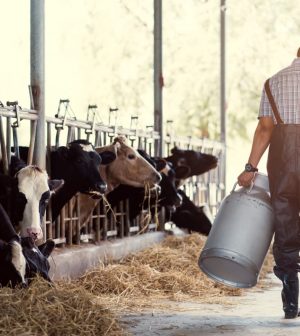- Could Your Grocery Store Meat Be Causing Recurring UTIs?
- Are You Making This Expensive Thermostat Error This Winter?
- Recognizing the Signs of Hypothyroidism
- 10 Strategies to Overcome Insomnia
- Could Artificial Sweeteners Be Aging the Brain Faster?
- Techniques for Soothing Your Nervous System
- Does the Water in Your House Smell Funny? Here’s Why
- Can a Daily Dose of Apple Cider Vinegar Actually Aid Weight Loss?
- 6 Health Beverages That Can Actually Spike Your Blood Sugar
- Treatment Options for Social Anxiety Disorder
CDC Reports Second Dairy Worker Infected With Bird Flu

A second case of bird flu has been detected in another dairy worker, this time in Michigan, U.S. health officials reported Wednesday.
The first case was reported in a dairy worker in Texas in early April.
Officials said the Michigan individual, who only experienced mild symptoms, contracted the H5N1 virus after being exposed to infected livestock, the U.S. Centers of Disease Control and Prevention said in a news release.
“While a nasal swab from the person tested negative for influenza in Michigan, an eye swab from the patient was shipped to CDC and tested positive for influenza A[H5] virus, indicating an eye infection,” the agency said. As in the Texas case, the patient only reported eye symptoms.
“While it’s not known exactly how eye infections result from avian influenza exposures, it may be from contamination of the eye[s] potentially with a splash of contaminated fluid, or touching the eye[s] with something contaminated with A[H5N1] virus, such as a hand,” the CDC added.
“Given the high levels of A[H5N1] virus in raw milk from infected cows, and the extent of the spread of this virus in dairy cows, similar additional human cases could be identified,” the agency added.
Still, this latest case doesn’t suggest that bird flu is widespread in people, officials said, adding that the risk to the general public remains low.
“This virus is being closely monitored, and we have not seen signs of sustained human-to-human transmission at this point,” Dr. Natasha Bagdasarian, Michigan’s chief medical executive, told the New York Times.
The case suggests that as more herds are infected, farmworkers continue to be vulnerable to bird flu infection, however. “This case was not unexpected,” CDC Principal Deputy Director Dr. Nirav Shah told the Times.
In the meantime, the agency recommends that all health workers collect both nasal and eye swabs from people exposed to the virus. “This is why making sure samples are taken in full compliance with CDC guidelines is really important,” Shah noted.
Veterinarians have reported that some farmworkers have developed flulike symptoms, but few farmers and farmworkers have agreed to be tested for the cause. As of Wednesday, the CDC had tested only about 40 people, agency officials told the Times.
“We found this case because we were looking for this case, and we were looking for it because we were prepared,” Shah stressed.
The virus has been detected in 52 dairy herds in nine states, according to the U.S. Department of Agriculture, but the outbreak is thought to be much more widespread. Meanwhile, the U.S. Food and Drug Administration has found traces of the virus in 20 percent of dairy products sampled from grocery shelves in 17 states.
During the outbreak, the virus has acquired dozens of new mutations, including some that may make it more more able to spread between species.
To prepare for the possibility of more cases, federal agencies have begun to fill and finish approximately 4.8 million doses of a vaccine that is well matched to the circulating strain of H5N1, officials told the Times.
More information
The CDC has more on bird flu in humans.
SOURCES: U.S. Centers for Disease Control and Prevention, news release, May 22, 2024; New York Times
Source: HealthDay
Copyright © 2026 HealthDay. All rights reserved.










